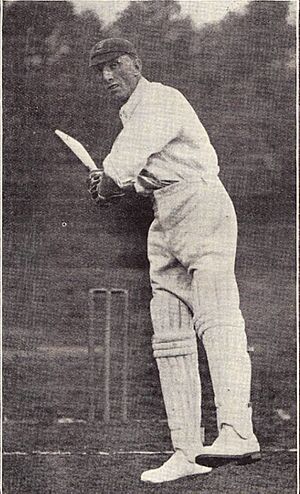Jack Russell (cricketer, born 1887) facts for kids

Russell in 1921
|
||||||||||||||||||||||||||||||||||||||||
| Cricket information | ||||||||||||||||||||||||||||||||||||||||
|---|---|---|---|---|---|---|---|---|---|---|---|---|---|---|---|---|---|---|---|---|---|---|---|---|---|---|---|---|---|---|---|---|---|---|---|---|---|---|---|---|
| Batting | Right-handed | |||||||||||||||||||||||||||||||||||||||
| Bowling | Right-arm slow medium | |||||||||||||||||||||||||||||||||||||||
| International information | ||||||||||||||||||||||||||||||||||||||||
| National side | ||||||||||||||||||||||||||||||||||||||||
| Test debut | 17 December 1920 v Australia | |||||||||||||||||||||||||||||||||||||||
| Last Test | 22 February 1923 v South Africa | |||||||||||||||||||||||||||||||||||||||
| Career statistics | ||||||||||||||||||||||||||||||||||||||||
|
||||||||||||||||||||||||||||||||||||||||
|
Source: CricInfo, 9 May 2014
|
||||||||||||||||||||||||||||||||||||||||
Charles Albert George "Jack" Russell (born October 7, 1887 – died March 23, 1961) was a famous English cricketer. He was known as one of the best batsmen in county cricket after World War I. Jack Russell played with his right hand for both batting and bowling. He was a medium-slow bowler. His special skill was hitting the ball well on the leg side. He was a careful player who did well even on tough cricket pitches.
Contents
Early Cricket Career
Jack Russell came from a cricket family. His father, Thomas Russell, was the first regular wicket-keeper for the Essex team. Jack's cousin, Tich Freeman, was also a well-known bowler for Kent.
Russell started playing for Essex in 1908. But he really became a key player in 1913. In that year, he scored over 1,000 runs. He kept scoring over 1,000 runs for the next three years.
Becoming a Top Batsman
In 1920, Jack Russell scored an amazing 197 runs against Middlesex at Lord's. This game showed everyone he was a top-class batsman. That year, he scored 2,432 runs in total. This was the third-highest score in the country. Because of his great performance, he was chosen to play for England in the Ashes series in Australia that winter.
Playing for England
England lost all five Test matches in Australia. This was partly because their professional bowlers struggled on the hard Australian pitches. However, Jack Russell did very well. He averaged 58.42 runs in all matches. He even scored 135 runs in a game in Adelaide.
In 1921, England played against Warwick Armstrong's Australian team. Jack Russell was not picked for the first three Test matches. England was largely beaten in these games. He was finally brought into the team for the fourth Test. He scored 101 runs in that match. In the final Test, he scored 102 runs without being out. His strong batting helped England draw the last two Tests. Even so, Australia won the series 3–0.
Russell's Best Season
The year 1922 was Jack Russell's best season. He scored 2,575 runs, which was his personal best. He even scored more runs than Jack Hobbs, who was a very famous player. Because of his excellent year, he was named a Wisden Cricketer of the Year. He also scored 162 runs at Lord's that season.
Success in South Africa
That winter, Russell traveled to South Africa. The pitches there were very challenging. Despite this, he played incredibly well. He scored 436 runs with an average of almost 63.
In the final Test match, which would decide the series, Russell was very ill. People later said he should not have been playing. But he still managed to score 140 runs in the first part of the game. Then, in the second part, he scored 111 runs over four and a half hours. He was the first English batsman to score a century (100 runs) in both parts of the same Test match. He is still the only player to score centuries in both parts of his final Test match.
Later Career and Retirement
In 1923, Russell's performance was greatly affected by his illness. He only recovered his form after resting for two weeks in late June. His batting average dropped from 52 to 29.71. This meant he was not considered for England's team anymore. Other players, like Herbert Sutcliffe, started to take his place.
Despite this, Russell had another strong year in 1925. He hit seven centuries and scored 2,080 runs. In 1928, he scored 131 and 104 runs against Lancashire. Lancashire was the County Champion team for the third year in a row that season.
After an injury-filled year in 1929, Jack Russell played only one more season. He then retired from playing. He became a county coach and later worked as a groundsman, taking care of the cricket fields. In 1949, twelve years before he passed away, Russell was one of the first professional cricketers to become a member of the Marylebone Cricket Club (MCC).
 | Jewel Prestage |
 | Ella Baker |
 | Fannie Lou Hamer |

